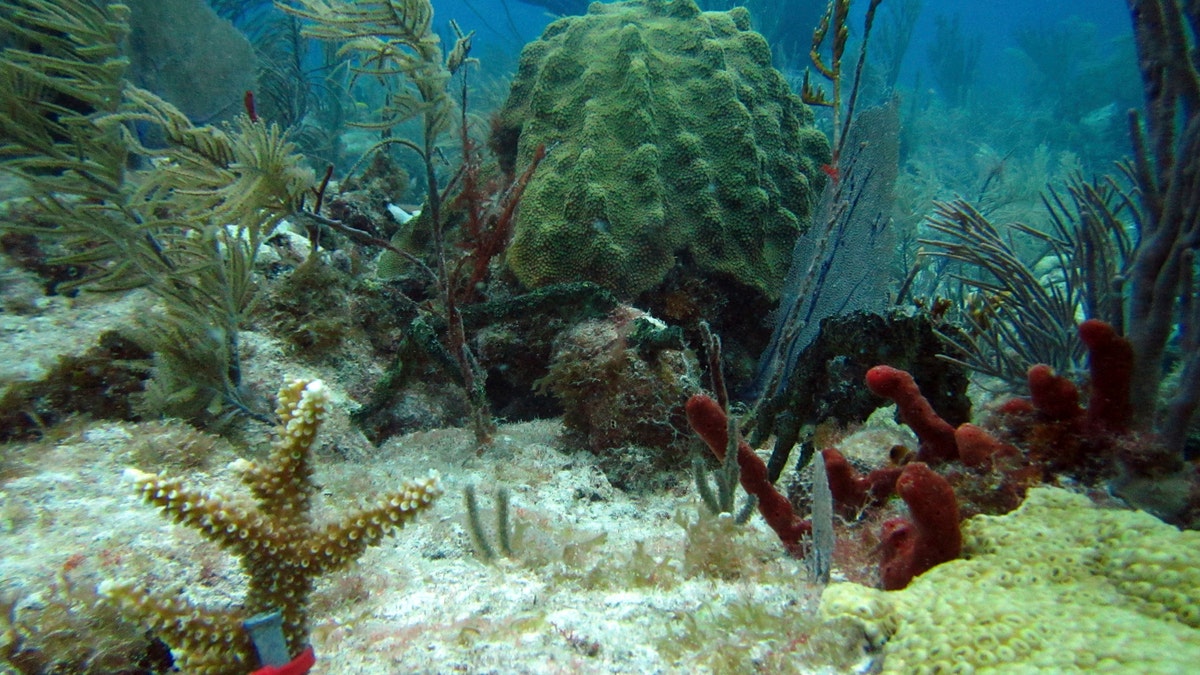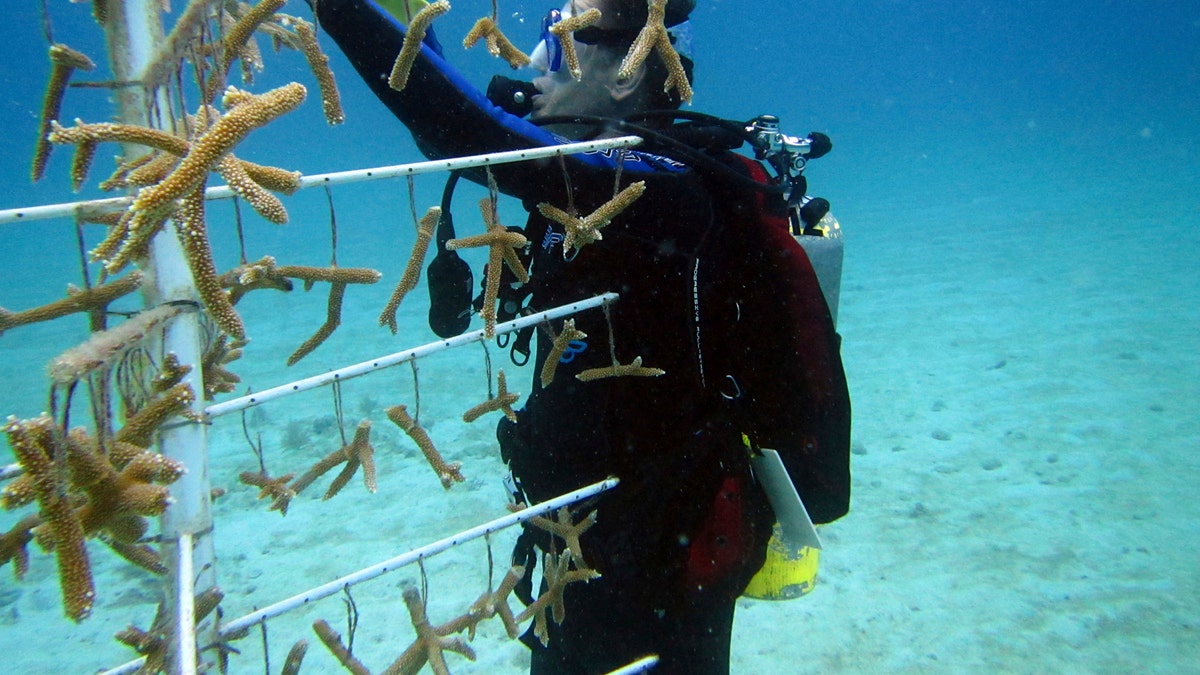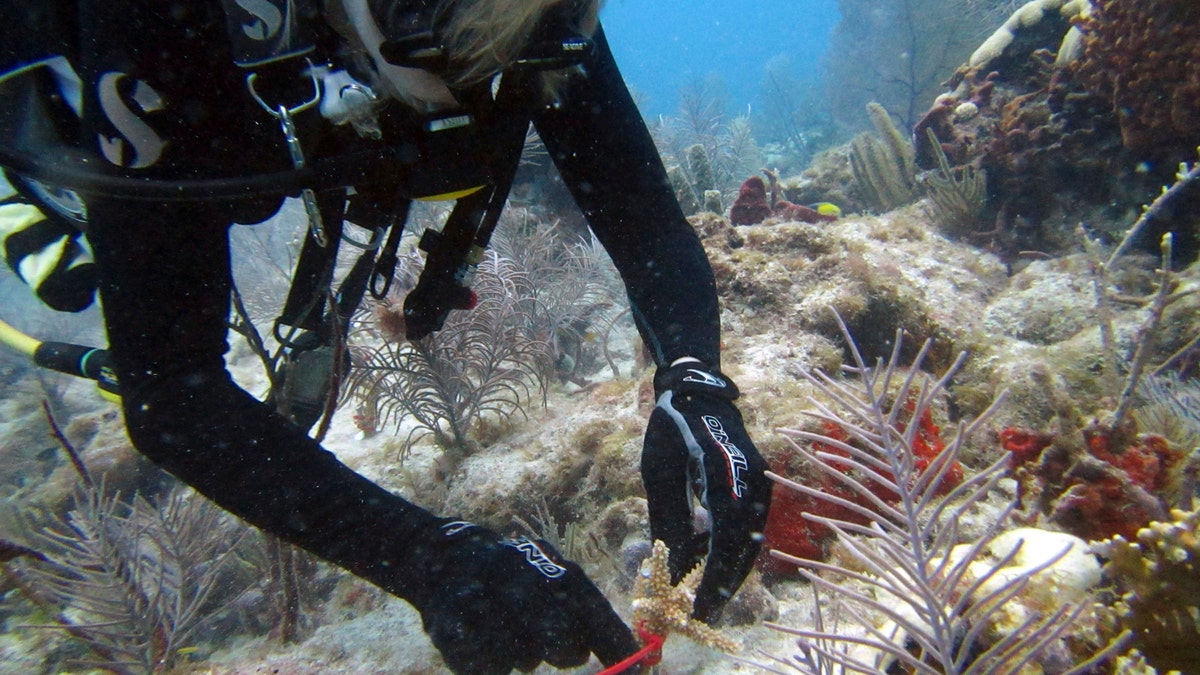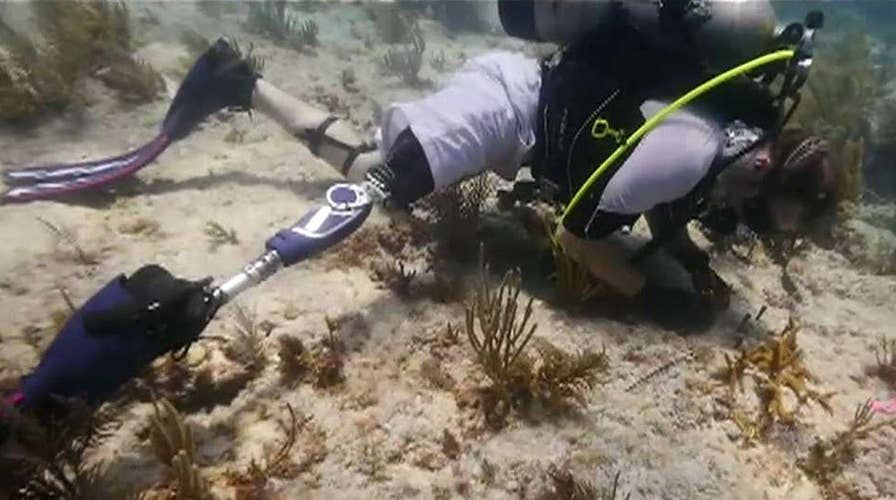Under gorgeous blue skies and above spectacularly blue waters of the Florida Keys, veterans Justin Lansford and Billy Costello are on a dive boat. Their mission: To save the planet, one coral at a time.
"This mission is extremely critical,” said Costello, who lost a leg when stepping on a land mine in Afghanistan. "Talking about guys that have served, they think of their profession as service. If you leave that profession of service, I think you continue to look for ways you can continue to serve. Especially your own country. This is a way to continue to serve at home by taking care of the problems that exist all around us.”

This June 3, 2017, photo made available by the University of Miami, shows a diver swimming near a newly planted staghorn coral off Key Biscayne, Fla. (Dalton Hesley/University of Miami RSMAS via AP)
WOUNDED VETERAN IN VIRAL BOSTON MARATHON VIDEO TOUCHED BY ATTENTION
The two are among dozens of wounded warriors who are teaming with marine experts to try and save Florida’s decaying barrier reef, the only tropical reef in the continental U.S.
Florida’s barrier reef, the third largest in the world, is dying. Over the past century, marine scientists say pollution, over-fishing, ocean acidification and rising sea temperatures have stressed the coral, leading to massive die-offs.
"Coral reefs are the rain forests of the oceans,” said Michael Crosby, president and CEO of Mote Marine Laboratory, which oversees the reef restoration project. "If we lose the coral reefs, we’ll lose the oceans and we lose the very oxygen that we breathe.”

This June 3, 2017 photo made available by the University of Miami, shows a diver inspecting a staghorn coral nursery off Key Biscayne, Fla. The coral will be transplanted to a reef to replace coral that has died due to bleaching and other effects of climate change. (Dalton Hesley/University of Miami RSMAS via AP)
VETERANS, LAWMAKERS TEAM UP TO TREAT PTSD WITH DOGS
The marine scientists with Mote, volunteer kids with SCUBAnauts and about a dozen wounded warriors spent the day about 20 feet underwater, where large swaths of bleached out coral reef exemplify what once was a thick and colorful forest of marine life. Mote is now growing staghorn coral in an underwater garden, from which they clip off small pieces of the coral to then transplant, using zip ties and nails.
Over time, a whole new coral colony of the threatened species will blossom, supporting the marine ecosystem and the multi-billion dollar fish-related economy. Reefs also are critical for hurricane protection, as healthy reefs break up fierce hurricane waves before they slam the mainland.
Justin Lansford lost his leg, and nearly his life, when a bomb exploded underneath his armored truck in Afghanistan. He was on top of the truck, operating the machine gun. The explosion flipped the truck, pinning him underneath it.
NFL PLAYERS AND COMBAT VETERANS JOIN FORCES TO SAVE LIVES
“The way you look at things, the way you look at life, drastically changes,” he said.

This June 3, 2017 photo made available by the University of Miami, shows a diver planting a staghorn coral nursery off Key Biscayne, Fla. The coral is grown in underwater nurseries and then transplanted to a reef to replace coral that has died due to bleaching and other effects of climate change. (Dalton Hesley/University of Miami RSMAS via AP)
Just like Costello, Lansford scuba dives with one prosthetic leg, and a fin fitted over his artificial foot. After years of grueling physical therapy for both veterans, helping to restore the critically important reef helps both of them keep their states-of-mind above the surface.
“It gives me a mission, it gives me a purpose,” Lansford said. “Even if it's coming down here for a day and doing it, it feels good to do something and accomplish something."
He said it also helps him in other ways.
"The fact that I was able to get back to SCUBA diving—which is something I can do for myself therapeutically, but also with the family, as a family—it was a tremendous part of my recovery,” Costello said. “It's a way for us to continue to serve in a different capacity, but, for the betterment of the nation.”
On this dive, the scientists and citizen-scientists transplanted 500 pieces of coral. But Crosby points out, they still have millions more to go.
"The only way the coral reefs will survive is if we use science to restore them and bring them back,” Crosby said. "And that’s what this whole mission here that we’re on today is all about.”









































